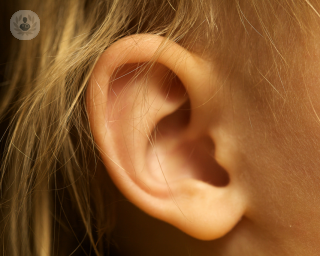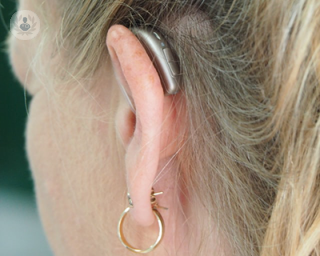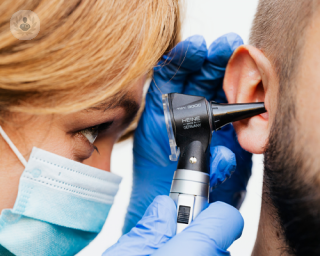Ear infection
Mr Vikram Dhar - Otolaryngology / ENT
Created on: 07-16-2020
Updated on: 04-18-2023
Edited by: Sophie Kennedy
What is an ear infection?
An ear infection is when there is a bacterial or viral infection in the part of the internal ear, known as the middle ear. This condition is called otitis media. The space behind the eardrum where the infection starts becomes swollen due to a build up of fluid and often results in pain. Ear infections can be mild, acute, or chronic.
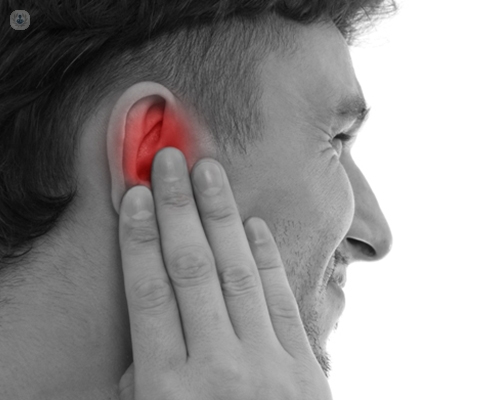
What are the symptoms?
Symptoms of an ear infection are presented as:
- consistent pain inside the ear
- fluid or drainage coming from the ear tunnel
- trouble or loss of hearing in affected ear
- headache
- dizziness
- a sensation of the ears being plugged
- swelling or tenderness of the ear
- reduced balance
- a feeling of pressure that can’t be removed by usual methods
- children and infants may appear fussier than normal, have loss of appetite, troubles sleeping, and usually with a high fever (100ºF/38ºC)
It is important to note that chronic ear infection symptoms may not be as noticeable as those with acute ear infections. Chronic ear infection is when the infection does not go away or it continues to return. Often it means there is a hole in the eardrum that will not heal and can cause permanent damage if not treated.
What are the causes?
The most common cause of an ear infection is from a cold or previous respiratory infection. The bacteria or virus can travel through the eustachian tubes to the middle ear. Other causes may be allergies, smoking, or changes in air pressure or altitude. If there is inflammation of the nasal lining, this can cause a blockage in the eustachian tubes leading to an infection.
Can ear infections go away on their own?
Yes, some ear infections often go away on their own and clear up within seventy-two hours. Ear infections are more common amongst children and will become less of a problem as people get older. If they become a regular occurrence, it is a good idea to speak with your doctor to find out what the underlying cause is and avoid any permanent damage.
What are the treatments?
If the ear infection does not clear up on its own, there are traditional methods as well as medications that can help.
- warm or cold compresses using a cloth
- over-the-counter mild pain medication, such as ibuprofen or acetaminophen
- ear drops to treat pain
- antibiotics prescribed by a doctor
- observing and/or running tests
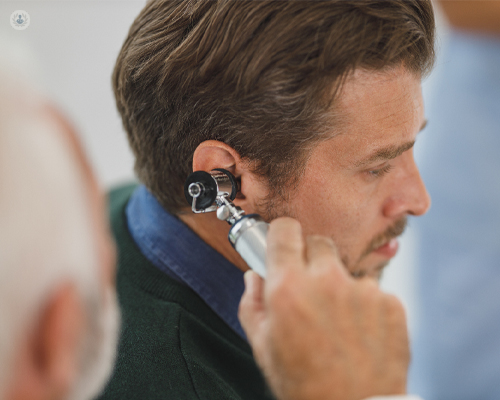
Do antibiotics help?
Most of the time antibiotics will not be prescribed because the ear infection is not severe enough or it is caused by a virus (as is the case with most ear infections). If a doctor has run tests and has determined that the infection is caused by bacteria and the infection has not gone away, an antibiotic will be prescribed. If so, it is important to follow the directions and take all the medicine to avoid the infection from returning.
What are home remedies for an ear infection?
As ear infections often go away on their own without needing medical attention, common home remedies to alleviate symptoms are:
- Warm or cool compress: use an ice or heat pack and put it on the affected ear. If you do not have an ice or heat pack, a washcloth soaked in warm or cool water can be used as an alternative. Try each temperature to see which one helps relieve pain the most.
- Over-the-counter (OTC) pain medication: the most common are ibuprofen and acetaminophen.
- Sleeping position: keeping your head and ear elevated when sleeping may help with painful symptoms as it lessens the pressure on the ear.
- Neck exercises: the muscles in the neck are connected to the ear, so moving and stretching them may help alleviate the pressure in the ear.
- Distraction: seemingly simple, it can work great for children to make them more comfortable, and it can also work for adults.
Some home remedies to avoid are:
- Oils: it may not get to the source of the infection and they are not proven to be safe to put in the ear.
- OTC numbing drops: they may help pain briefly, but they can also have adverse effects and cause more pain.
What are additional tests that may be done?
If home remedies are traditional treatment has not improved the ear infection and the doctor needs to make a diagnosis, there are a few other tests that can be done. The most common are:
- Tympanometry: an evaluation of the eardrum to see how it moves with acoustics, testing the middle ear function.
- Acoustic reflectometry: a test done by using a device to measure the sound frequency spectrum result to assess how much fluid is in the middle ear, known as middle ear effusion or glue ear.
Other tests that may be recommended if a child has chronic ear infections include going to a speech therapist, developmental therapist, or hearing specialist to assess if there if there are any problems with speech skills, language comprehension, developmental skills, or hearing.
When should you seek a doctor?
Some ear infection symptoms could indicate a more serious problem. Make an appointment with a doctor if one or more of these are present.
- pain is no longer mild and has become severe
- lots of fluid or bloody discharge has started coming from the ear
- symptoms do not improve after a few days
- a child younger than 6 months is presenting with symptoms
- the infection is accompanied by a high fever
Which specialists treat ear infections?
If the ear infection can no longer be treated by your GP, an otolaryngolost (ENT) surgeon treating ears, nose, and throat will treat the ear infection.



